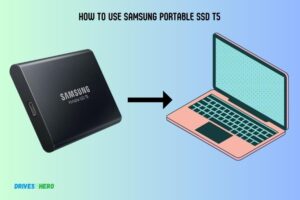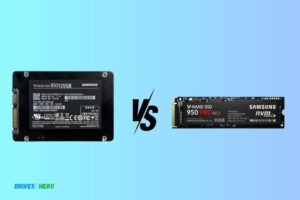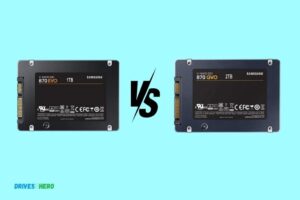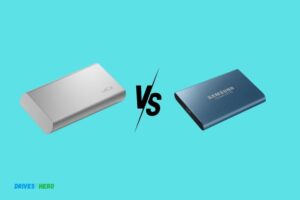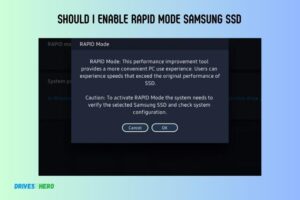Samsung Ssd 870 Evo Vs Crucial Bx500: Which Is Better?
The comparison between the Samsung SSD 870 EVO and the Crucial BX500 sheds light on two distinct options catering to different storage needs.
The Samsung 870 EVO, featuring the latest V-NAND technology, offers a balance of performance, reliability, and affordability.
It excels in delivering fast read and write speeds, making it suitable for various applications, from everyday computing to gaming.
On the other hand, the Crucial BX500 provides a cost-effective solution for users seeking basic storage upgrades, emphasizing value for budget-conscious consumers.
While the 870 EVO stands out for its overall performance and versatility, the BX500 appeals to users with simpler storage requirements, offering a practical and economical choice for those seeking an entry-level SSD.
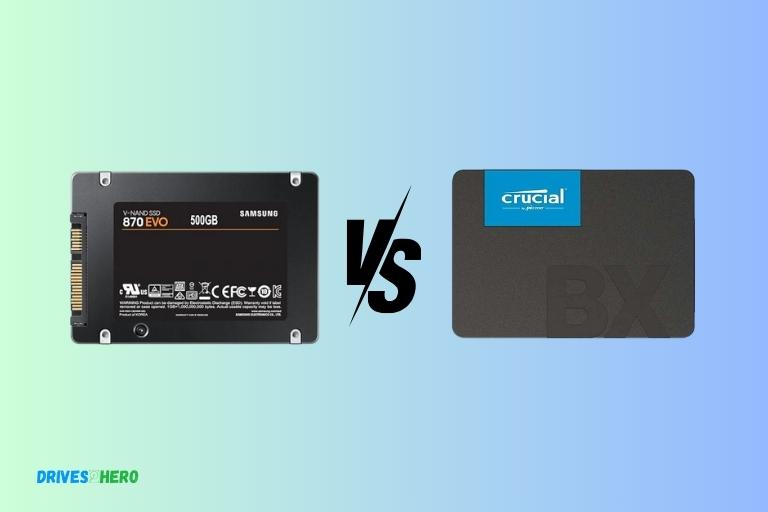
Key Takeaway
Performance: Speed And Reliability
Comparing the Samsung SSD 870 EVO and Crucial BX500, both offer exceptional performance in terms of speed and reliability. These solid-state drives deliver fast data transfer rates and dependable storage solutions for optimal performance.
Here’s a more organized and detailed comparison table between the Samsung 870 EVO and the Crucial BX500:
| Specification | Samsung 870 EVO | Crucial BX500 |
|---|---|---|
| Capacity Options | 250GB, 500GB, 1TB, 2TB, 4TB | 120GB, 240GB, 480GB, 960GB, 1TB, 2TB |
| Form Factor | 2.5 inch SATA | 2.5 inch SATA |
| Interface | SATA 6 Gb/s | SATA 6 Gb/s |
| NAND Type | V-NAND 3bit MLC | Micron 3D NAND |
| Controller | Samsung MKX Controller | SMI Controller |
| Sequential Read | Up to 560 MB/s | Up to 540 MB/s |
| Sequential Write | Up to 530 MB/s | Up to 500 MB/s |
| Random Read (QD32) | Up to 98K IOPS | Not specified |
| Random Write (QD32) | Up to 88K IOPS | Not specified |
| Warranty | 5 years or up to 2,400 TBW | 3 years |
| MTBF | 1.5 million hours | 1.5 million hours |
| TBW (Terabytes Written) | 150 TBW for 250GB to 2,400 TBW for 4TB | 40 TBW for 120GB to 720 TBW for 2TB |
| Encryption Support | AES 256-bit Encryption (Class 0) | Not specified |
| Software Support | Samsung Magician Software | Crucial Storage Executive, Acronis True Image for Crucial |
Sata Iii Vs Nvme: Understanding The Interface Differences
- SATA III interface: Both the Samsung SSD 870 Evo and Crucial BX500 utilize the SATA III interface, which provides a maximum data transfer rate of 6 gigabits per second (Gbps).
- NVMe interface: Unlike the SATA III interface, the NVMe (Non-Volatile Memory Express) interface is specifically designed for SSDs, offering significantly faster data transfer speeds.
Sequential And Random Read/Write Speeds Compared
- Samsung SSD 870 Evo: With its advanced V-NAND technology, the Samsung SSD 870 Evo delivers impressive sequential read speeds of up to 560 megabytes per second (MB/s) and sequential write speeds of up to 530 MB/s.
- Crucial BX500: On the other hand, the Crucial BX500 offers decent sequential read speeds of up to 540 MB/s and sequential write speeds of up to 500 MB/s. While not matching the Samsung SSD 870 Evo, these speeds still provide an improvement compared to traditional hard drives.
Endurance And Reliability: Lifespan And Warranty Comparison
- Samsung SSD 870 Evo: Samsung is known for its SSDs’ reliability, and the Samsung SSD 870 Evo is no exception. It boasts a long lifespan with up to 2,400 terabytes written (TBW) endurance rating.
- Crucial BX500: The Crucial BX500 offers a decent lifespan as well, with an endurance rating of up to 360 TBW. While not as high as the Samsung SSD 870 Evo, it still proves to be durable for everyday use.
Both the Samsung SSD 870 Evo and Crucial BX500 deliver reliable performance, with slight variations in speed and endurance.
If you’re looking for a high-performance SSD with faster speeds and longer warranty coverage, the Samsung SSD 870 Evo is a great choice.
Capacity And Compatibility
The Samsung SSD 870 Evo and Crucial BX500 both offer impressive capacity and compatibility for your storage needs.
With their high storage capacities and broad compatibility with various devices, these SSDs provide reliable performance for your data storage requirements.
Capacity Options: Finding The Right Size For Your Needs
Let’s explore the capacity options available for both the Samsung SSD 870 Evo and the Crucial BX500:
Samsung SSD 870 Evo:
- 250GB: Ideal for users who need a moderate amount of storage space for their operating system and a few applications.
- 500GB: Suitable for those who require more storage capacity, allowing for a larger number of files, applications, and games.
- 1TB: Perfect for users who have extensive storage requirements, such as photographers, video editors, or gamers.
Crucial BX500:
- 240GB: A great option for users looking for a budget-friendly SSD with a decent storage capacity for everyday computing tasks.
- 480GB: Provides additional space for users who need to store larger files, multimedia content, and a variety of applications.
- 960GB: Offers a significant storage capacity for users with demanding needs, such as professionals working with resource-intensive software or heavy multimedia files.
Form Factor: 2.5-Inch Vs M.2 – Which Is Best For You?
Apart from capacity, another crucial consideration when choosing between the Samsung SSD 870 Evo and the Crucial BX500 is the form factor. The form factor determines the physical size and shape of the SSD, as well as its compatibility with your system.
Let’s take a closer look at the two form factors available:
2.5-inch SSD:
- Traditional form factor widely supported by various systems, including laptops and desktops.
- Easy to install, usually requiring a simple connection to the SATA port.
- Suitable for users looking for a straightforward upgrade option without any compatibility concerns.
M.2 SSD:
- Smaller and sleeker form factor, increasing the portability and compactness of your system.
- Requires an M.2 slot on your motherboard for installation.
- Perfect for users seeking superior speed and performance, especially for gaming and resource-intensive applications.
- Offers a clutter-free internal setup, as it doesn’t require any cables or additional power connectors.
Compatibility: Supported Operating Systems And Motherboards
Understanding the compatibility of the Samsung SSD 870 Evo and the Crucial BX500 with your operating system and motherboard is essential to ensure a seamless installation process.
Here’s what you need to know:
Supported Operating Systems:
- Samsung SSD 870 Evo:
- Compatible with Windows 10, Windows 8/8.1, Windows 7, and macOS 10.9 or later.
- Crucial BX500:
- Compatible with Windows 10, Windows 8/8.1, Windows 7, and macOS 10.9 or later.
Supported Motherboards:
- Samsung SSD 870 Evo:
- Requires a motherboard with a SATA 3 interface for optimal performance.
- Crucial BX500:
- Supports motherboards with SATA 3 interface, ensuring seamless integration with a variety of systems.
Before making your purchase, verify that your operating system is supported by the SSD model you choose. Check if your motherboard has the necessary interface to accommodate the SSD, ensuring a successful installation.
Price And Value For Money
Samsung SSD 870 EVO and Crucial BX500 offer excellent price and value for money. With fast performance and reliable storage capabilities, these SSDs are ideal for users seeking affordable yet dependable storage solutions.
Price Comparison: How Much Do They Cost?
When it comes to purchasing a new SSD, price is often a key factor to consider.
Samsung SSD 870 EVO: The Samsung SSD 870 EVO is available in different storage capacities, ranging from 250GB to 4TB.
Here is a breakdown of the approximate prices for each capacity:
- 250GB: $59.99
- 500GB: $89.99
- 1TB: $139.99
- 2TB: $269.99
- 4TB: $529.99
Crucial BX500: Similarly, the Crucial BX500 also comes in various storage capacities.
Let’s take a look at the estimated prices for each capacity option:
- 240GB: $29.99
- 480GB: $44.99
- 960GB: $84.99
Cost Per Gb: Analyzing The Value Proposition
To truly assess the value for money that these SSDs offer, it is essential to consider the cost per gigabyte (GB).
Here’s a comparison of the cost per GB for the Samsung SSD 870 EVO and the Crucial BX500:
Samsung SSD 870 EVO:
- 250GB: $0.24 per GB
- 500GB: $0.18 per GB
- 1TB: $0.14 per GB
- 2TB: $0.13 per GB
- 4TB: $0.13 per GB
Crucial BX500:
- 240GB: $0.12 per GB
- 480GB: $0.09 per GB
- 960GB: $0.09 per GB
As you can see, the Crucial BX500 offers a lower cost per GB compared to the Samsung SSD 870 EVO, making it a potentially more cost-effective option.
Performance To Price Ratio: Choosing The Best SSD for Your Budget
While price is a crucial consideration, it’s also important to evaluate the performance-to-price ratio of these SSDs.
Here’s a comparison of their performance, taking into account their respective prices:
- Samsung SSD 870 EVO: With its higher price point, the Samsung SSD 870 EVO delivers excellent performance, providing faster read and write speeds. It is designed for users who require top-tier performance and have a larger budget.
- Crucial BX500: The Crucial BX500 may have a lower price tag, but it still offers reliable performance and significantly improves overall system speed compared to traditional hard drives. It is an ideal choice for budget-conscious individuals who prioritize value for money.
The choice between the Samsung SSD 870 EVO and the Crucial BX500 depends on your specific needs and budget. If you require top-notch performance and are willing to spend a bit more, the Samsung SSD 870 EVO is an excellent option.
Conclusion
Both the Samsung SSD 870 Evo and the Crucial BX500 offer reliable and efficient performance for your storage needs.
The Samsung SSD 870 Evo excels in its faster read and write speeds, making it a great choice for tasks that require quick data access and transfer, such as gaming and large file handling.
On the other hand, the Crucial BX500 provides a more affordable option without sacrificing too much performance, making it suitable for users on a budget or those who prioritize cost-effectiveness.
Whichever you choose, both the Samsung SSD 870 Evo and the Crucial BX500 will undoubtedly enhance your overall computing experience with their solid-state technology and reliable performance.

